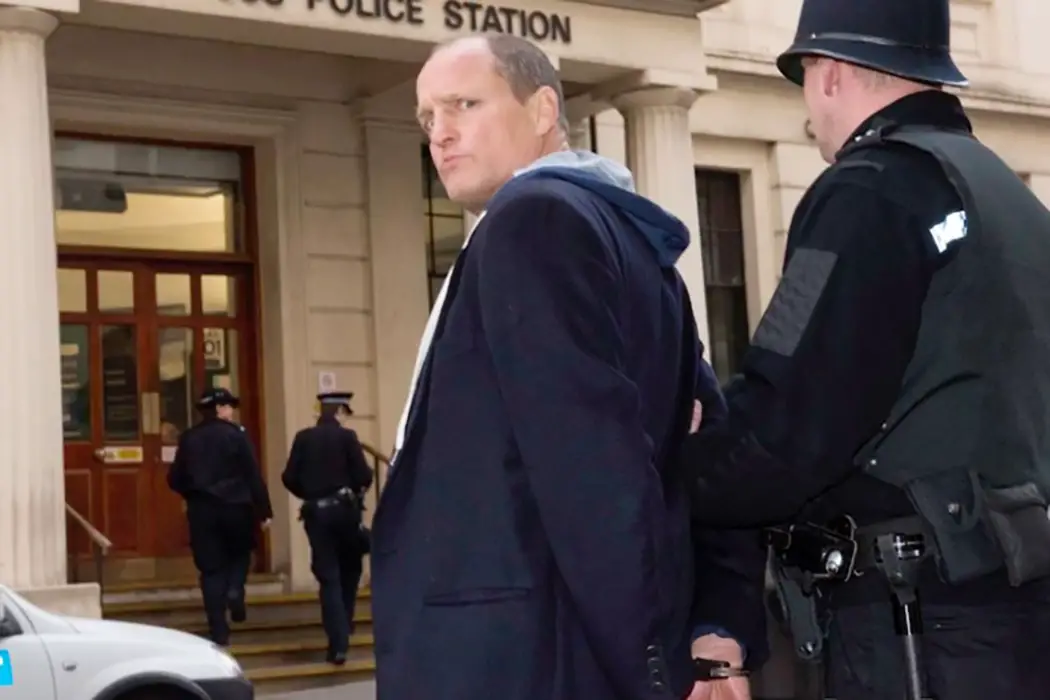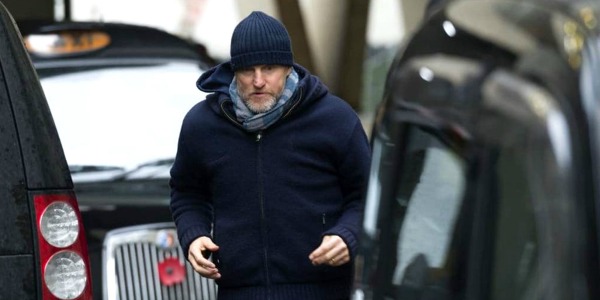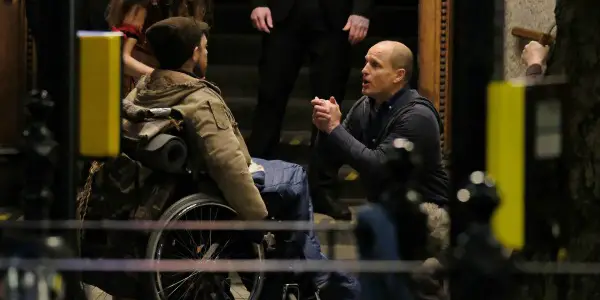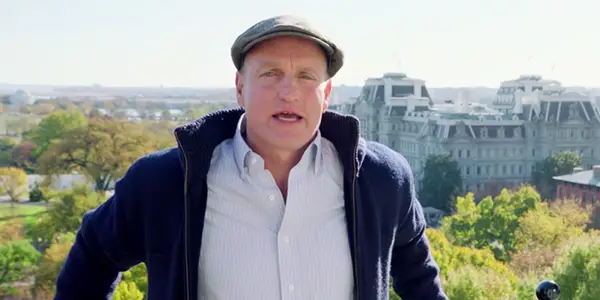“This Movie Was Almost Impossible”: An Exclusive Interview With Woody Harrelson

Alistair is a 25 year old writer based in Cambridge.…
Not only is Woody Harrelson’s directorial debut Lost in London a near-perfect blend of autobiography and meta elements, the process of interviewing him after seeing it feels oddly meta too. After watching his screen persona being subjected to people referencing films he’d starred in years before that he barely remembers now, witnessing the end of a meet and greet, where two fans awkwardly quote Tommy Lee Jones dialogue from Natural Born Killers at Harrelson, is a scene of brilliantly pitched awkwardness that would have felt at home in the film itself.
I could have easily delved in to Harrelson’s filmography for this interview, as he’s been a staple of American pop culture for more than thirty years, proving equally at home in ensemble comedy, brooding drama, and blockbusters without a single shred of artistic subtlety – and almost always proving to be the best thing in every film in which he’s starred. His directorial debut is a long time coming indeed, but is definitely worth the wait; a semi-autobiographical tale of a drunken night in 2002 that ended with a heated argument with his wife, a fight with a taxi driver, imprisonment, then fleeing to hide out on the set of Harry Potter and the Chamber of Secrets.
Although he’s embarrassed by his actions on the night, making a film debut documenting his behaviour has proved cathartic. But Harrelson’s ambitions don’t stop there. Filmed back in January, the film was the world’s first ever “live movie”, documented in one take and beamed to 500 cinemas worldwide as the cameras were rolling. Inspired by 2015’s Victoria and 2002’s Russian Ark (with some added Fellini influence for extra measure), Lost in London is a truly unforgettable experience. We spoke to Woody Harrelson about stepping behind the camera for the first time – and what it is truly like to make a “live movie”.
Alistair Ryder for Film Inquiry: As a first time filmmaker, even though you’ve been making films as an actor for so long, have you been nervous about audience reactions to Lost in London?
Woody Harrelson: Yeah – I mean, I feel a little bit consoled and more confident now after these screenings. I don’t feel 100% confident, but it’s definitely got to the stage where I feel confident that people are going to like it. I don’t know how people will resonate with it in the States, but of the four times we’ve played this to an audience here in the UK, each audience have been terrific and I’m really psyched about the reaction. God knows it could have gone the other way!
Did you always intend for Lost in London to be your directorial debut, or was there ever a possibility of you handing this project to another filmmaker?
Woody Harrelson: Well, I had another script I started before called The Misadventures of Mr Fitz, which takes place in Ireland – there’s a lot of slapstick humour in that one. I’ve written three movie screenplays and two plays, but they’re all comedy. I mean, I just want to get people to laugh. It’s such a joyous thing and it really gives me great satisfaction. But with this one, I figured it would be a lot easier to do first, as opposed to a straight comedy. Fitz, the other screenplay I was working on, was a lot more involved due to the physical comedy elements.

Once I thought of doing Lost in London as a “one-er”, I thought it would be a lot easier. I didn’t realise it would be very hard, probably harder than anything I could have taken on in terms of directing. But even during this process, I couldn’t imagine handing this project to another filmmaker.
You wrote the screenplay long before you had the idea of doing it as a “one-er”- so how far back does this project originate? When did you start writing the first draft?
Woody Harrelson: God, you know, it has to be ten, twelve years since the very first draft. But then I didn’t pick it up again for another two years – I was, shall we say, shocked by how bad it was. So, a couple of years pass and then I take a look at it again, and what I originally intended to do when I wrote the first draft was to get the structure of the story, above anything else. I didn’t expect it to be anything great and it wasn’t, but structurally, it was perfectly formed and perfectly correlated to what actually happened that night. That structure has managed to stay in place right to the finished film. Luckily, a lot of it has changed for the better since then too!
As well as being a “One-er”, this is the world’s first ever live film. Was this innovative technique always your artistic intention?
Woody Harrelson: That concept came way later, but I did always want to shoot it in real time – and in this case, get it all done in 99 minutes. I didn’t ever expect to shoot it in live broadcast, but that idea came later and it just felt oddly natural. My two big passions are film and theatre, and I was trying to find a way that I could merge the two. It was only later that I realised Jeez, the only way you can merge film and theatre is that you need a live audience – and that’s when I thought “oh my god, I wonder if we can shoot it in real time, maybe we could broadcast it as we shoot it!” Which is a wild thought.

I mean, obviously, they’ve done live broadcasts of plays straight from the theatre in to cinemas. But this was going to be way more involved, which led to me trying to find out if this was remotely possible. So, I tried to find out if we could do this and tons of people told me it wasn’t possible. And they were almost right – it nearly didn’t come together, so this movie was almost impossible!
You said during on set interviews that you were trying to make the film look clean and natural, without calling attention to the fact there is a camera actively documenting what’s on screen in real time. Were there any issues when trying to capture this realism?
Woody Harrelson: I mean, one of the big issues to achieving the look was trying to resolve the issue of how to ensure the camera didn’t steam up when moving from somewhere cold to somewhere hot. I don’t even remember how that got resolved – our original idea was at a huge expense, so had to be scrapped, but then when we filmed it, it wasn’t cold enough to affect the lenses. Then we started worrying about rain affecting the filming – and again, the typical British weather was on our side for a change and everything went down as planned!
Many actors have directed before – how were you able to direct and act in a live broadcast, making sure everything ran smoothly while you were in front of the cameras at all times?
Woody Harrelson: While we’re running the scene, I’m in front of the camera. But I spent a lot of time at our shooting locations during pre-production, including St Martin’s, where I was figuring out everything, from capturing the images to putting together the wardrobe, the make-up and the art direction. There’s lots of things to take care of behind the scenes and that’s why it was so hard to be in front of the camera. In some ways, it was one of the hardest characters I’ve ever played, because I was spending so much time live in front of the camera, constantly thinking about the other factors and hoping everything was going down okay all around me.

So when you’re directing something like this, are there any ways that you give cues to the crew while filming, or is it just a leap of faith for the whole feature length take?
Woody Harrelson: Once we started rolling, there was no way to pull off any directing, y’know. I did make one artistic decision as a director while filming – and it was a mistake. We were in the van near the very end, a scene where I find out Laura isn’t coming to bail me out of jail and during that sequence, the camera is supposed to start panning around, going from me to the other actors.
So the scene starts with the pan around, but as this is all taking place in a moving vehicle, there was also a big issue with how long it took to get from where we were to Waterloo Bridge, where the following scene was set. During rehearsals, it took eight minutes the first time, so we had to get a police escort and everything else, so we managed to get it down to three. But it has to be two minutes or less, otherwise it’s a disaster – it’s just running too long!
So, we got it down to two minutes, but the guy who was driving drove so fast it was crazy, with these motorcycle cops leading us. So the camera starts pulling around, we were going around a corner or something, and I put my foot out to help the cameraman John, as I thought he was starting to slide. So I tapped him, and he thought that meant bring the camera back – and he thought “finally, this guy’s directing!” It comes back in to a two-shot of me and Owen (Wilson), when really it should have kept panning around. But little things like that give the movie character – he thought I was trying to direct and I was just giving him a helping foot.
Despite the lack of directing, it’s still one of the most accomplished directorial debuts I’ve seen recently. Have you taken any advice from any of the filmmakers you’ve previously worked with?
Woody Harrelson: Jim Brooks (James L. Brooks) told me something useful – you’ve got to have your buddy with you while making this thing, so you have someone on the inside who can tell you this is shit. Because if it’s somebody you know, then you know they’re telling the truth. That was a smart move. That guy for me was Anthony Genn, who did the music; I started having him coming to the rehearsals as we were running them all the way through.
He gave me some good advice – he was the guy who told me that I had to take the jokes out of the first scene, it has to start emotionally heavy. I took his advice and took out the jokes. Owen Wilson was advising the same thing about the restaurant scene – take out the jokes. The film is still funny, heck, that scene is still funny. But focusing on those elements less helped set the narrative more clearly.
The other filmmaker who gave me advice wasn’t one I have worked with, but he did have an office upstairs from me while I was in production with this, and that was Paul Thomas Anderson. The advice he gave me sounds obvious, but it’s effective – instead of trying to focus on a dozen things at once, try to accomplish one task at a time, only moving on to the next one when you’ve completed the one you’re currently on. It was advice I wish I’d taken before. Back when I was at school, I would have loved to hear that when trying to tackle mountains of homework, because my method of coping was just doing none at all!
After broadcasting live for one night only back in January, Lost in London returns to UK screens for a full cinematic release on May 5th.
Does content like this matter to you?
Become a Member and support film journalism. Unlock access to all of Film Inquiry`s great articles. Join a community of like-minded readers who are passionate about cinema - get access to our private members Network, give back to independent filmmakers, and more.
Alistair is a 25 year old writer based in Cambridge. He has been writing about film since the start of 2014, and in addition to Film Inquiry, regularly contributes to Gay Essential and The Digital Fix, with additional bylines in Film Stories, the BFI and Vague Visages. Because of his work for Film Inquiry, he is a recognised member of GALECA, the Gay & Lesbian Entertainment Critics' Association.













